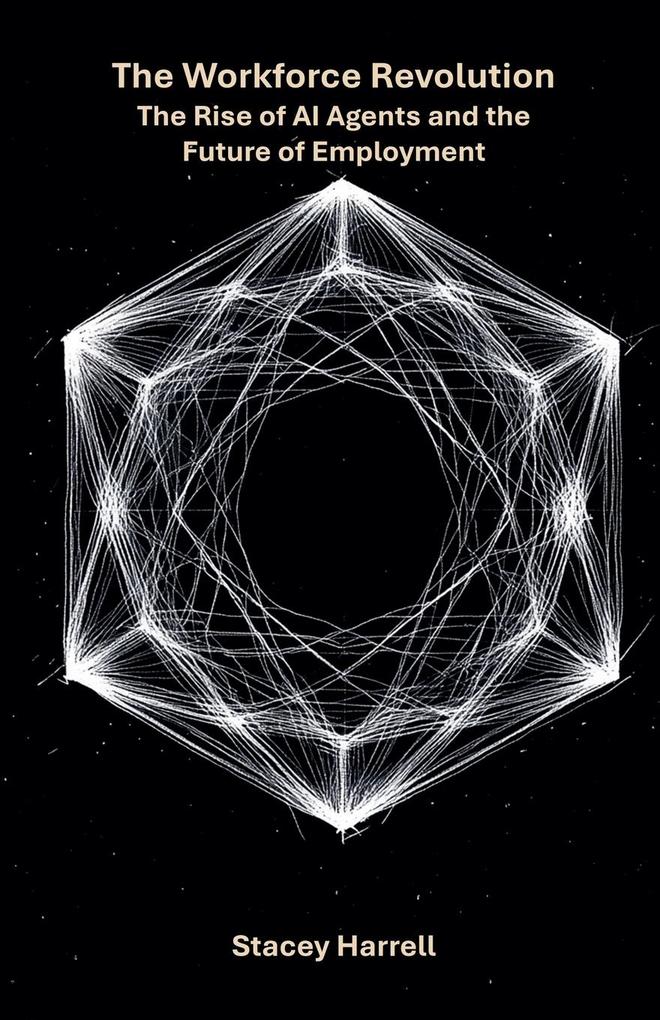
Zustellung: Do, 12.06. - Di, 17.06.
Versand in 2 Wochen
VersandkostenfreiBestellen & in Filiale abholen:
"The Workforce Revolution: The Rise of AI Agents and the Future of Employment" explores the transformative impact of AI agents on the workforce, focusing on the rise of Auto-GPT and Devin as key players in shaping the future of work. The book delves into the historical context that has led to the development and integration of AI agents in various industries, and examines the implications of this technological revolution on employment and society as a whole.
The narrative begins with the emergence of artificial intelligence as a field of study in the mid-20th century, tracing its evolution from early concepts and theoretical frameworks to the practical applications that have revolutionized industries in the 21st century. As AI technology advanced, so did the capabilities of AI agents, leading to the development of sophisticated systems like Auto-GPT and Devin that are capable of performing complex tasks and making decisions autonomously.
The book highlights the significance of Auto-GPT and Devin in the context of the workforce revolution, showcasing how these AI agents have disrupted traditional modes of work and introduced new possibilities for efficiency and productivity. Auto-GPT, a cutting-edge language model, has revolutionized natural language processing and content generation, enabling businesses to automate tasks that were once performed by human workers. Devin, on the other hand, is a versatile AI assistant that can handle a wide range of tasks, from customer service to data analysis, with speed and accuracy.
Throughout the book, the author explores the ethical and social implications of AI agents in the workplace, raising questions about the impact on job security, income inequality, and the nature of work itself. By examining case studies and real-world examples, the author illustrates how AI agents are reshaping industries and prompting organizations to rethink their approaches to talent management and workforce development.
As the narrative unfolds, the reader gains insight into the challenges and opportunities presented by the rise of AI agents, from concerns about job displacement and skills obsolescence to the potential for enhanced collaboration and innovation in the workplace. The book argues that the successful integration of AI agents into the workforce requires a strategic approach that combines technological expertise with a human-centric focus on employee well-being and professional development.
In conclusion, "The Workforce Revolution: The Rise of AI Agents and the Future of Employment" offers a comprehensive analysis of the impact of Auto-GPT and Devin on the future of work, presenting a nuanced perspective on the opportunities and challenges that lie ahead in the era of AI-driven automation. By contextualizing these developments within the broader historical trajectory of artificial intelligence and workforce dynamics, the book provides valuable insights for policymakers, business leaders, and individuals navigating the evolving landscape of work in the 21st century.
The narrative begins with the emergence of artificial intelligence as a field of study in the mid-20th century, tracing its evolution from early concepts and theoretical frameworks to the practical applications that have revolutionized industries in the 21st century. As AI technology advanced, so did the capabilities of AI agents, leading to the development of sophisticated systems like Auto-GPT and Devin that are capable of performing complex tasks and making decisions autonomously.
The book highlights the significance of Auto-GPT and Devin in the context of the workforce revolution, showcasing how these AI agents have disrupted traditional modes of work and introduced new possibilities for efficiency and productivity. Auto-GPT, a cutting-edge language model, has revolutionized natural language processing and content generation, enabling businesses to automate tasks that were once performed by human workers. Devin, on the other hand, is a versatile AI assistant that can handle a wide range of tasks, from customer service to data analysis, with speed and accuracy.
Throughout the book, the author explores the ethical and social implications of AI agents in the workplace, raising questions about the impact on job security, income inequality, and the nature of work itself. By examining case studies and real-world examples, the author illustrates how AI agents are reshaping industries and prompting organizations to rethink their approaches to talent management and workforce development.
As the narrative unfolds, the reader gains insight into the challenges and opportunities presented by the rise of AI agents, from concerns about job displacement and skills obsolescence to the potential for enhanced collaboration and innovation in the workplace. The book argues that the successful integration of AI agents into the workforce requires a strategic approach that combines technological expertise with a human-centric focus on employee well-being and professional development.
In conclusion, "The Workforce Revolution: The Rise of AI Agents and the Future of Employment" offers a comprehensive analysis of the impact of Auto-GPT and Devin on the future of work, presenting a nuanced perspective on the opportunities and challenges that lie ahead in the era of AI-driven automation. By contextualizing these developments within the broader historical trajectory of artificial intelligence and workforce dynamics, the book provides valuable insights for policymakers, business leaders, and individuals navigating the evolving landscape of work in the 21st century.
Produktdetails
Erscheinungsdatum
11. Mai 2025
Sprache
englisch
Seitenanzahl
240
Autor/Autorin
Stacey Harrell
Verlag/Hersteller
Produktart
kartoniert
Gewicht
281 g
Größe (L/B/H)
216/140/14 mm
ISBN
9798231685189
Bewertungen
0 Bewertungen
Es wurden noch keine Bewertungen abgegeben. Schreiben Sie die erste Bewertung zu "The Workforce Revolution" und helfen Sie damit anderen bei der Kaufentscheidung.










